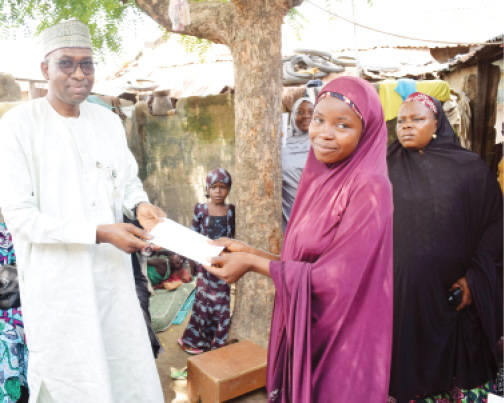How 50 FCT women got loans to boost their businesses
Succour came the way of some rural women entrepreneurs when they received the sum of N50, 000 loans each to boost their businesses. 25 of them were given the money at the New Kuntunku Community of Gwagwalada Area Council on Tuesday, while the other 25 received theirs at the Dutse Community in Bwari Area Council, […]


Succour came the way of some rural women entrepreneurs when they received the sum of N50, 000 loans each to boost their businesses. 25 of them were given the money at the New Kuntunku Community of Gwagwalada Area Council on Tuesday, while the other 25 received theirs at the Dutse Community in Bwari Area Council, Abuja.
One of the women, Asabe Sani, said the loan would help her move her business to the next level.
Asabe who sells wrappers said the money could not have come at a better time than now that she needed to buy more wares to sell for the coming Eid-el-Fitr.
“I sell wrappers. I will add this money to my business and buy more goods and my business will grow. This will help me to make more money this Sallah period to help myself, my children and family,” she said.
The loans were disbursed by the Abuja Enterprise Agency (AEA) through its subsidiary bank, FCT Micro Finance Bank (FMFB), to 25 women from the Gwagwalada Market Women Cooperative (GMWC) and 25 women of the Bethel Multipurpose Cooperative (BMC), Dutse.
The Managing Director of AEA, Mr. Muhammed Tukur Arabi, said the loan was from the Internal Micro Credit Scheme (IMCS) of the agency.
“We chose to empower these women through their cooperative societies because they are all into trading. Some are into sale of food items, footwear, wrappers and blouses, children’s clothes, grinding of grains and so on. The idea is to help them to upscale their businesses. It is the policy of the AEA to support businesses that are doing well in such a way that the communities can be beneficiaries and their immediate families as well.
“In our records, we have over 123 cooperative groups. Last year we were able to empower 43 of them. Our target is to see if we can empower another 43 this year, then in 2019, our hope is to empower the rest of the cooperatives,” he said.
Asked if the earlier beneficiaries had repaid, the Manager, Credit Risk Management of AEA, Chidinma Nduka, said most of them were diligent in paying back.
“When it comes to rural people, it is usually very interesting working with them. It is so amazing how they are willing to cooperate and are willing to pay back. It is one thing to be able to pay back and it is another to be willing to pay back.
“Usually, they are willing to pay back, and even when they don’t have money to pay immediately, they are willing to restructure. I am usually very comfortable working with them,” she said.
Nduka said the agency dealt with both start-ups and existing businesses and cooperatives. “For the ones that want loans, they come to our credit department. We asses them, check their businesses, their capacity and whether they had collected loan before and if they had paid back. We check whether they are registered or not; we help them register.”
She said the agency did not just give funds, but rendered business advisory services, training for capacity building and business development services before loans were disbursed with the support of the FMFB.
The Team Leader of Rural Community Development in the agency, Safiya Umar, said she was happy because the funds were getting to people in the rural areas.
“I am very delighted about the event today. Most of the SMEs’ funds do not usually get to the grassroots, but today, for the women to be able to get the funds, we are very happy,” she said.
She further said the agency would be checking on the women once every month to see if their businesses were going well.
The leader of the Gwagwalada Market Women Cooperative (GMWC), Halima Abubakar, said she was happy about the gesture.
“I am happy about the money that was given to us today. I will be going to their houses to see how their businesses are doing and to make sure that they repay the loans,” she said.
The women would pay back the loan spread over a period of one year by paying N4,950 monthly.
